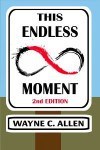Find Your Calling
This is post 2 of 2 in the series “Universal Rules”
Synopsis: Find Your Calling — we all have one — a calling, a vocation, a purpose. Finding yourself means finding your path.
Of Wayne’s many books, the one closest to today’s topic is: This Endless Moment 2nd. edition
 Click image for more info!
Click image for more info!The 2nd. edition of This Endless Moment is available from Amazon.
The new version has 100 plus more pages of insights and helps.
You’ll discover the resources you need for living a centered, fulfilled, and aware life.
The paperback version is here:This Endless Moment 2nd. edition
The kindle version is here:This Endless Moment 2nd. edition
 It must be here somewhere…
It must be here somewhere…Calling, vocation, and purpose are loaded words.
Vocation, especially, comes with baggage; it’s a leftover word from ancient Christianity. Nonetheless, it’s an essential word, because it reminds us that each of us is called to “be our best selves.”
This article is going to contain some cludgy language, like “best.” Being a Zen guy, I don’t think that way, and from a Zen perspective, we don’t actually have a best self to strive after.
And yet. It is also clear to me that people do indeed have skill sets. Every person has something they do exceptionally, and their lives suffer if they don’t “do what they do best.”
OK, so for this article, let’s just play with this, and use the terms vocation and calling, which I will “de-religious-ify” as we go along.
Example: The character Forrest Gump is the ultimate example of a “non-special” person having a calling, or purpose or vocation. The movie totally dispels the notion that only “special” people have callings. The opposite is the case. All people have callings — only “special” people seem to notice. Or so it seems.
And then I remember listening to Ram Dass; he spoke in Toronto back in ’82. One thing he said was that the road to enlightenment was eased by practicing ‘Nobody special training.’ In his view, we’re all special without actually being special at all.
And yet, the majority flee from the idea of vocation.
Which is too bad — the world suffers for this. So.……
Let’s get rid of vocation’s baggage
The idea that there is a difference between a vocation and a job goes back to the Middle Ages. Prior to the Enlightenment, entering the priesthood was almost the only way to get an education. Everything we consider to be a helping profession was church run and supported. (i.e. churches ran hospitals and trained doctors, and priests did the counselling — through the sacrament of confession, mostly.)
As to vocation, the thinking was that “god” called “special” people into special service, and that service meant being a member of “the religious.” Priests, monks and nuns, and church scholars were thought to have callings, or vocations. Since their gifts were presumed to be god-given, they were “better” people (and the vocation was “higher”) than the jobs held by mere mortals.
The Enlightenment created a powerful struggle against Church domination. Ultimately, “the Church’s back was broken,” both by the scientists and philosophers, and by the Reformation. With the Reformation came the idea that vocations or a callings existed outside of the Church.
What has never changed, and rightly so in my view, is the idea that a calling is a calling into service.
Therefore, one might have a calling to teach, or counsel, or to be a doctor. One might have a calling to the Arts. One might have a calling to improve the lot of humanity through innovation or through business. My mechanic definitely has a calling. He’s a mechanical artist.
A way to differentiate a calling from a job might be to ask, “What is the purpose of this venture?” If the answer is “to make money,” one might ask, “for whom?” If the answer is, “To enrich myself and the stock-holders,” one might question the “vocational” nature of such a venture. If the answer is, “To provide a service or product that others can choose to use to their benefit,” that might be a vocation.
To look at this from a slightly different angle, I remember a story my old buddy Dharmen used to tell — a story he learned from OSHO. It was about the Buddha. After he gained enlightenment, off he went, up the path to Nirvana. As he reached the top of the path, he looked back and saw all of humanity below him, struggling to understand.
He was moved to great compassion, and turned back, taking up his vocation to present to others what he had discovered.
Now, what he didn’t do was to force people to “get it.” The Buddha sat back down and started telling stories and teaching “the truth” as he knew it. His calling, then, was not “to force people to get it.” His calling was to speak his truth. What others chose to do with what he said was absolutely and only up to them.
So, how does all of this fit into calling and the majority’s resistance to it?
I think the resistance comes from the sense that if you begin to live your calling, there is no turning back. It’s no longer a job; it’s a vocation! (See? That word again.) You’re going to be doing this thing… forever.
And I think our instinct is correct: following a calling is serious business, because.….
One surrenders one’s self to the calling. I chose those words carefully.
To live your vocation, your self, your ego identity (in my case, my “Wayne-ness”) has to go far into the background. If it doesn’t, I might choose to use what I am called to do to, for example, get people to notice me. “See how special I am! Boy, have I got all of this figured out! Don’t you just love me?”
Interesting trip, this.
If I try to keep up my ego state while playing at my vocation, I’m going to burn out. Really, you have to choose, and choose, and choose again. Because nothing is permanent and nothing stays the same.
Fortunately, it’s easy to check up on ourselves, by going back to our question, “What is the purpose of this venture?” If I am honest, making is all about my “special-ness” could only have one purpose — to be seen as a guru or whatever. That’s not a vocation — it’s a sideshow.
This is where having a therapist who gets this stuff comes in handy. If you’re missing what game you’re playing, a competent therapist will be pleased to point it out to you.



